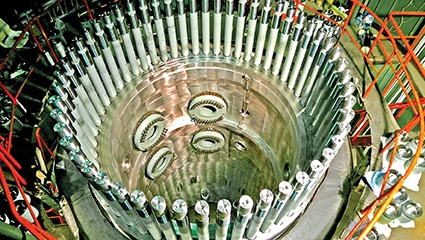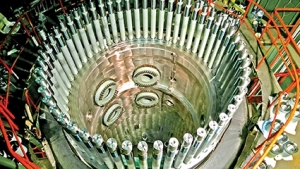Construction of 82 billion Rouble 4th Reactor at Rostov NPP Ongoing
Vasil Golubev, the head of the Rostov Region, visited the Volgodonsk-on-Rostov Nuclear Power Plant (NPP) to examine the third reactor and monitor the progress of work on the construction of a fourth.
At present the reactor is just 40 percent complete, and, as reported by Rostov Nuclear Power Plant (NPP) Director, Andrei Salnikov, the main construction works have been set up and installation of the equipment is finished.
In 2016, builders are going to carry out the basic technological operation which includes welding of the main circulation pipeline. 16 billion Roubles have been allocated to this stage of works, an amount that should cover all costs this year.
Golubev claims that adding a fourth reactor to the Rostov NPP will allow the region to be able to enter the top ten global locations for energy production. The energy increase will ensure the development of a partnership with Rosatom and empower schools to train highly qualified specialists.
The fourth reactor in particular is expected to provide electricity to the entire Rostov region and to Crimea, which badly needs the energy.
The reactor will be switched on in 2017.
At the end of 2015 the Plant began installation of the first steam generator. The plant ATOMMASH from Volgodonsk created 300 tonnes of large-sized equipment with a length of 15 m and a diameter of 4 m.
The fourth steam generator is the key stage to the reactor building. Total construction is expected to cost 82 billion Roubles.
The existing Rostov NPP generates more than 50 percent of all electricity generated in the Don. The total capacity of operating units is 3070 MW/h. Last year, nuclear power generated 20.5 billion kW/h of electricity (10.25% of total). In total since the opening of the Rostov NPP, 163.4 billion kilowatt / hours of electricity have been produced.
Construction began on the fourth reactor in 2010. Its planning and construction take into account all NPP accidents which have occurred around the world in the last fifty years.
Dimitri Dolaberidze












